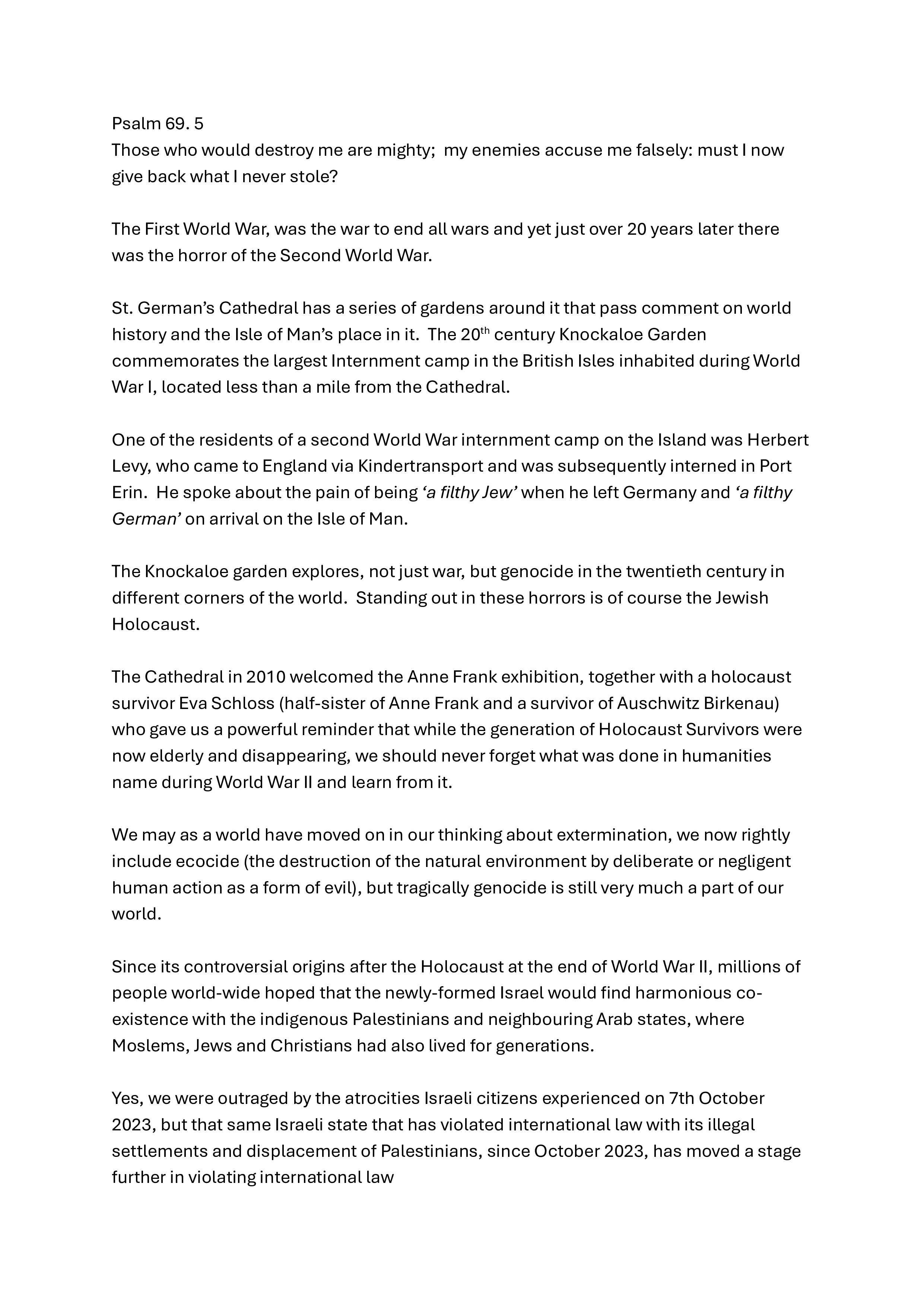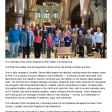Introduction
The Aim
The Rule of Life at St German’s Cathedral aims to distill the wisdom from The Rule of St Benedict and make it accessible to Christians in their daily living.
Why the Rule of Benedict?
The Rule of St Benedict was created in the late 5th early 6th century as he tried to be a faithful disciple of Christ. The Rule has stood the test of time and has deeply influenced the Anglican tradition, with almost 50% of its English cathedrals being former Benedictine Abbeys. The routine of daily prayer continues to this day.
Why a Rule of Life?
A Rule of Life is a framework, a sort of trellis, to help us to live a balanced Christian life. The Rule of Benedict aimed to offer men and women living in community ‘a school in the Lord’s service’ (Prologue). Some of the key characteristic of the Rule are: prayer & silence, study & manual labour, hospitality & service, stability & renewal.
An Invitation
We are inviting you to share in a Rule of Life to the degree that you feel is helpful to you, to see how together as the Cathedral community we might beneficially apply it to our life. The Rule encourages us to find balance in our life valuing others, ourselves and God above all things. So, keeping the trellis in mind let’s look at some aspects of the Rule that might help us grow and blossom to become the individuals God intends us to be in the ‘body of Christ’.
- Prayer & silence – Worship is our prime calling, maintain a pattern of Worship and prayer, listening to God (Chapter 43)
- Study & manual labour – discover the riches of Scripture, the Christian tradition, art and music and the importance of physical work and exercise (Chapter 48)
- Hospitality & service – give unconditional attention to the people you encounter, receiving all as if Christ himself (Chapter 53)
- Stability & Renewal – Celebrate the stability of Cathedral life, but be open to personal and corporate renewal, valuing space, rest and re-creation (Chapter 58)
Prayer & Silence.
Worship of the Living God, The ‘Opus Dei’ (The Work of God)is our prime calling (Chapter 43), while listening attentively to God is the way of being a disciple (Prologue).
The daily life of the Benedictine monk revolves around the eight daily services or ‘the Office’ together with the Eucharist which are spaced through the day and the night, beginning with Matins, followed by Lauds, Prime, Terce, Sext, None, Vespers and ending with Compline (Chapter 16). The prayers times make great use of the psalms and the scriptures (Chapter 9, 17). The times of prayer often mark a change of activity, for example, sleeping, studying and working.
Whilst the vocation of living a strict Benedictine routine might apply to a very limited number of people we can all take something from the Rule and build it into our everyday life.
These short frequent periods of prayer can be moments of silence and listening to God wherever you happen to be. There is of course Morning and Evening Prayer at the Cathedral daily and a short mid-day prayer is lead by the Cathedral Chaplains. The Angelus bell is also rung at 9.00am, 12noon and 5.30pm. (The Angelus is a prayer that joins ours with those of Mary the mother of Jesus.) You may want to consider making attendance at some of these ‘offices’ part of your daily routine, or if you are within earshot of the bells pausing for a moment and reflecting on the needs of our world. We have daily biblical readings that you can use at home.
Making space for listening to God during the day with its succession of tasks may not only help structure our day, but may also help us to have a more balanced perspective on life. All of us have different needs, so for each of us the pattern will be different (Chapter 36, 40).
The Rule of Benedict has a good deal to say about inappropriate speech ‘Murmuring’ (Chapter 5). We are encouraged to weigh carefully our words and attitude as we engage with others.
There are three things we might keep in mind when thinking of speech and silence:
- Stopping to be quiet, to pray, to listen and make space, carrying the scripture of the day in our heart.
- Trying to ensure we undertake a variety of tasks during the day.
- Being careful in our conversations, ensuring that our words are ones of encouragement
|
Some things to Consider: Prayer & Silence
|
Study & Manual Labour
Study and manual labour – discover the riches of scripture, the Christian tradition, art and music, and the importance of physical work and exercise.
St Benedict regarded idleness as the enemy of the soul (Rule, Chapter 48), but wisely tempered this with ‘Yet, all things are to be done with moderation’ (Rule, Chapter 48).
God wants us to be people of joy, and therefore life shouldn’t be drudgery, but God also wants us to reach our full potential and in so doing becoming co-workers in his mission on earth. Remember we are his hands, his eyes, his feet and his body (St Teresa of Avila).
The Benedictine life offers a rhythm of study and manual labour interspersed with worship and the normal routines of life which aim at wellbeing.
Physical activity is important for many reasons, here are some:
- It helps provide for the needs of society
- It helps keep us physically fit and therefore more alert to the work of God
- It rests our minds from study and gives space for reflection and refreshment
- It keeps us in touch with the earth and simpler ways of living.
Study helps us to learn from the knowledge, understanding and experience of others. There is real value in discovering the wisdom of previous generations, whose truths have sometimes been lost to the modern world. It also enables us to engage with the people of our own generation who bring new ideas and insights, enriching our understanding.
The Bible, the Word of God, has been handed down to us and we are invited to ‘ruminate’ on the scripture in prayer. We bring scripture, tradition, reason and experience together in dialogue. Particularly associated with the Benedictine Tradition is the practice of ‘Lectio Divina’ (Divine Reading) which does not treat scripture as a text to be studied, but as the living word to be engaged with. Lectio Divina involves:
- Reading - Taking time to read and digest the text
- Meditating - Pondering the text asking what it might be saying originally and today
- Praying - Using the text as the basis for intercession and confession etc.
- Contemplating - Resting with the text and listening to God
A Fifth stage is often taken for granted:
- Action - Asking how my life might change as a result of this encounter.
|
Some things to Consider: Study & Manual Labour
|
Hospitality & Service Offered in Humility
Hospitality and service – The Rule invites us to give unconditional attention to the people we encounter, receiving all as if Christ himself (chapter 53). This aspect of the Rule is inspired by Matthew’s Gospel: ‘for I was hungry and you gave me food, I was thirsty and you gave me something to drink, I was a stranger and you welcomed me’ (Matthew 25.35).
The Rule invites us to love and serve not only our family and friends, but our neighbours, strangers and enemies. Even people we have never met in the farthest flung regions of the world are part of God’s family.
Service and Hospitality are to be offered in humility(chapter 7).
The Cathedral aims to welcome all unconditionally; visitors and pilgrims through:
- Pastors and chaplains
- Hospitality and Welcomers
The Cathedral shares food and drink with those who seek refreshment, not just alongside services, but welcoming all to share in the Big Table Café on a Monday lunchtime where people pay what they are able. While offering food and meeting basic material needs, it is also about taking the time to engage and understand each other. For some it can make a massive difference just to know that someone acknowledges and cares for them.
Sometimes we allow ourselves to be caught up with the business of modern life blinding us to the glory of creation. Some fail to keep pace and find themselves on the margins. The Rule encourages us to value each other and creation (Chapter 31-32)
Then there are the needs of other people in the World, people we will never meet, who we can be connected with through the work of various charities.
|
Some things to Consider: Hospitality & Service offered in Humility
|
Stability & Renewal
While we can enjoy the stability of Cathedral life, we are commanded to be open to personal and corporate renewal (Chapter 58).
The Rule encourages us to be at peace with ourselves, those who surround us (Chapter 53) and creation (Chapter 53). As a sign of this aspiration we exchange the peace during the Eucharist.
Stability enables us to take risks as we pray and strive for peace in our broken world at the level of our:
- self
- family
- church community
- wider local community
- global community
- environment
In order to have the capacity to love our neighbour we need to attend to ourselves and be gentle; the Benedictine tradition encourages moderation (Chapter 31).
So to be able to offer service to others we need:
- time for re-creation
- space for rest an reflection
|
Some things to Consider: Stability & Renewal
|






